Table of Contents
Creatine is one of the most popular and best-selling supplements on the market of fitness and healthy diet products. Why is it so? Because creatine works. This has been confirmed by number of researches and renowned studies. So, let’s look at what creatine is and what its effects are.
What is creatine?
Creatine is a combination of three amino acids – glycine, arginine and methionine. However, this simple compound is involved in plenty of processes in the body. Creatine is found in skeletal muscle, heart, brain and kidneys. More than 95 % of creatine is stored in the muscles. However, the storage capacity of creatine is limited, although it increases with the muscle mass growth. A 70 kg man with an average figure can store approximately 120 g of creatine. [1]
Except supplementation, creatine is produced mainly in the liver. The amino acids glycine and arginine are enzymatically combined while forming guanidinoacetate which is then methylated to form creatine. Diseases that are associated with defects in natural creatine synthesis can result in muscle disorders as well as mental retardation. At the time of creatine supplementation, intrinsic creatine synthesis is suppressed, which may be beneficial to health due to the substantially costly production of creatine in the body. [1] [2]
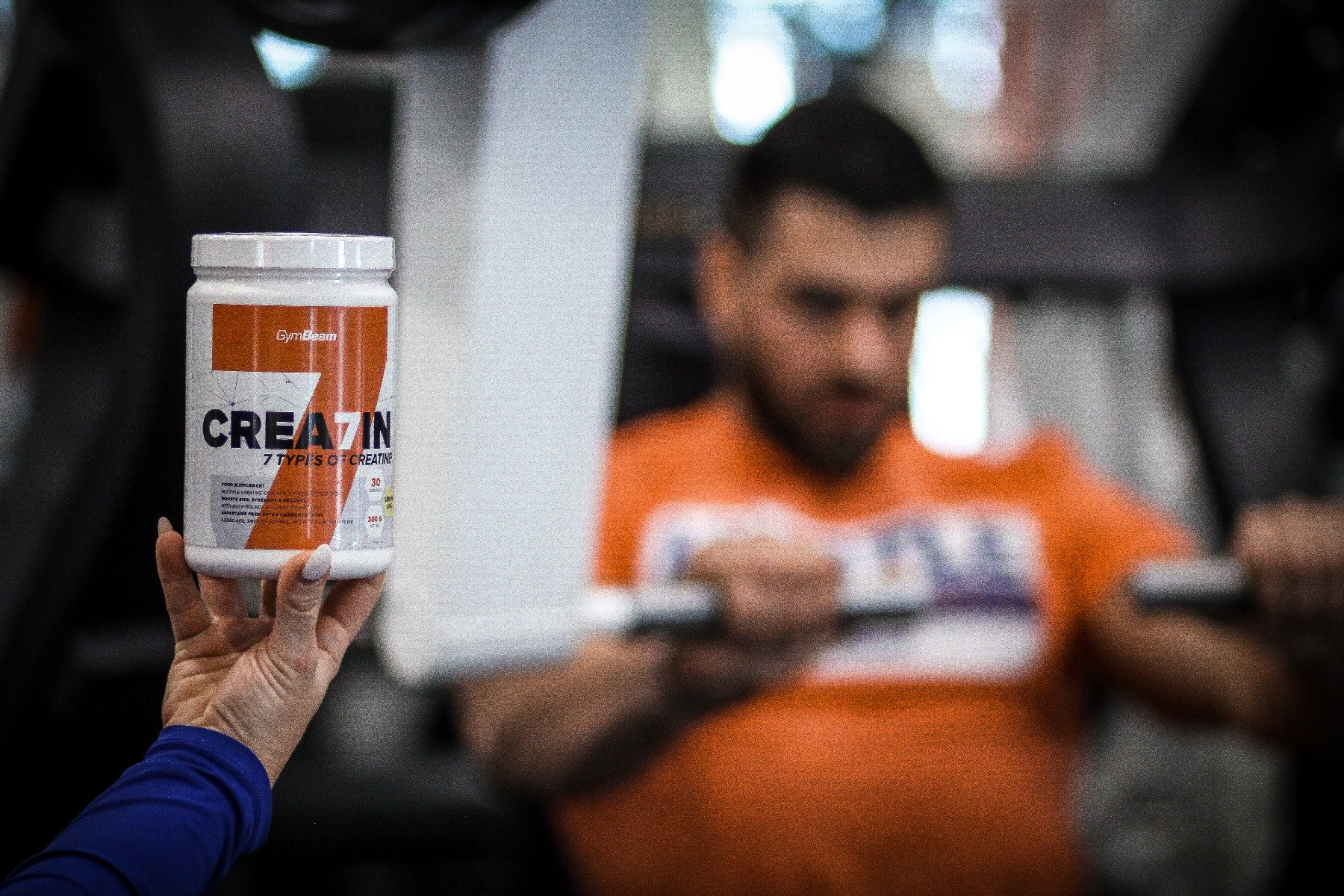
Sources of creatine
Creatine is obtained from food or nutritional supplements. It can be found in several foods rich in proteins, such as fish and meat. Look at the individual amount of creatine in meat products in the table below. [4] [5]
Creatine accumulates in the same organs in animals as in humans. Therefore, the creatine content is particularly high in heart tissue and muscles. A small amount of creatine can also be found in blood (0.04 %), in dry milk without water (0.88 %) and in breast milk (60 – 70 μm). Dairy products contain only a minimum amount of creatine, but besides meat they are the only important source of creatine in the diet. [4]
According to one research, the average creatine consumption from food in people aged 19 – 39 is about 1.08 g of creatine in men and 0.64 g of creatine in women. However, both values are below the recommended daily dose which starts at 2 g per day. [3] The standard dose of creatine is up to 5 g per day, so you don’t have to worry about taking also nutritional supplements with creatine content.
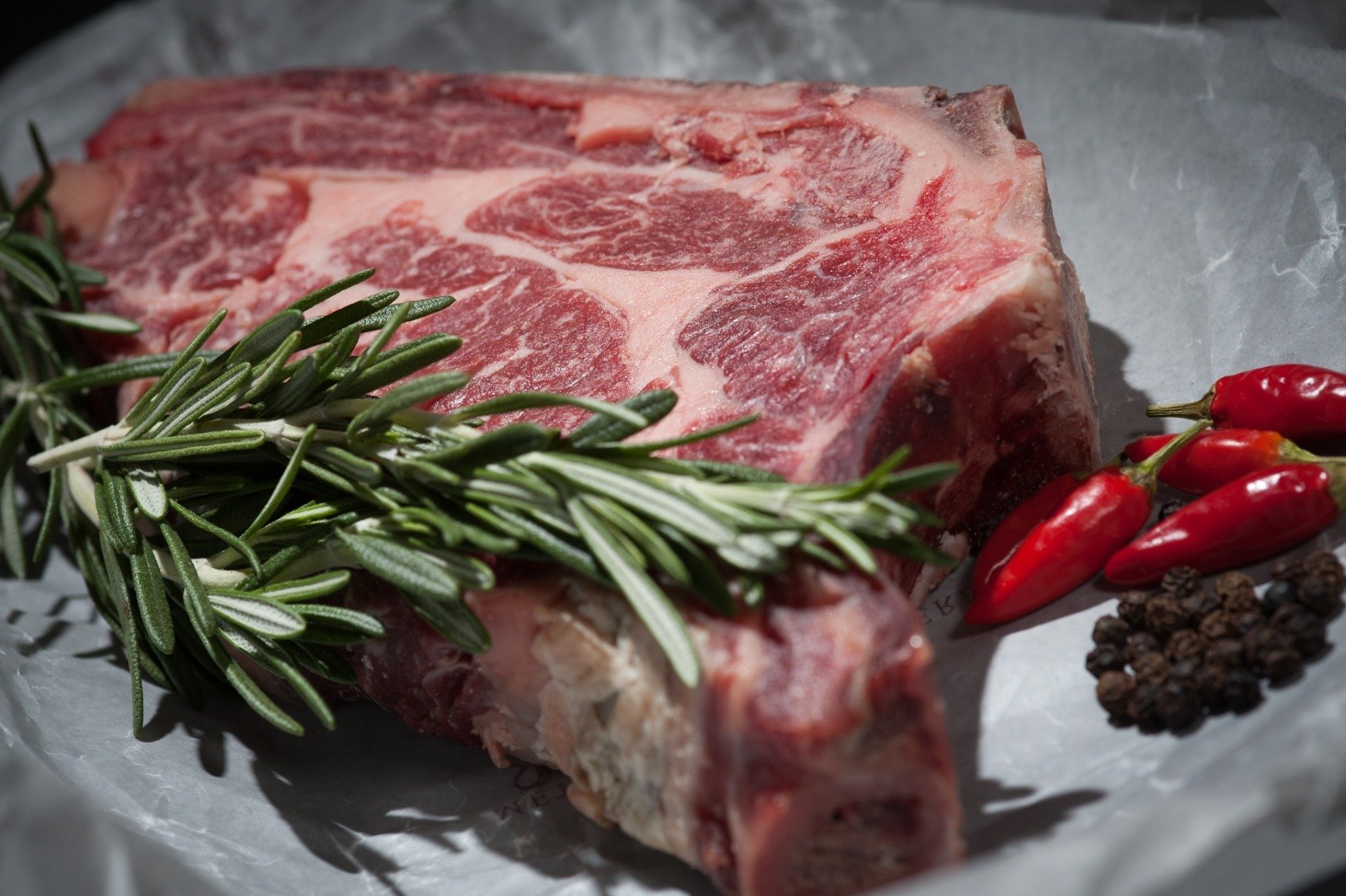
You might be interested in these products:
How does creatine work?
The most important effect of creatine is that it can support the energy production in the body during a weight training or a high intensity workout. After the body produces creatine or you resupply it in the form of supplements, it first binds to the phosphate molecule and forms creatine phosphate.
ATP (adenosine triphosphate) is an important source of energy in the body. When oxidizing carbohydrates, proteins and fats, the body generates energy and therefore ATP, which is essential for the proper functioning of processes in the body. The ATP provides energy by hydrolysing the phosphate group. [55] [56]
When the phosphate group is hydrolysed, energy is released in the form of heat. This energy is used for processes in the body, for example in muscle contractions. During this process, one phosphate is lost from ATP, so we now call it ADP (adenosine diphosphate). A free ADP was formed as a product of ATP hydrolysis. [55] [56]
ADP is unusable in the body unless it is converted back to ATP. It is at this point that creatine comes on the scene, which works by donating its phosphate group ADP to recreate ATP. Thus, creatine enables ATP production from ADP, allowing you to train longer and more intensively. Other primary effects of creatine derive from this primary benefit of creatine, which we will look at in the following lines. [55] [56]
What are the effects of creatine?
We have already discussed the primary effect of creatine, which is the production of energy for muscle cells. But what are the other positive effects of creatine on our body?
1. It helps to increase muscle mass
Creatine helps to increase muscle cells formation which leads to a direct muscle mass increase. Furthermore, it also promotes the production of proteins that form muscle fibres and it also helps to increase levels of insulin-like growth factor 1 (IGF-1) that effectively promotes muscle mass growth. One research conducted on a group that supplemented the strength training with creatine supplementation confirmed a visibly greater change in muscle mass volume compared to the group that did not supplement the strength training with creatine. [58] [59] [60] [61]
Creatine supplementation can also increase the water content of your muscles, which can also lead to a rapid increase in their volume. However, it should be noted that this is not a long-term and sustainable growth. [63] In addition, some studies suggest that creatine lowers the levels of myostatin, the molecule responsible for stopping the muscle growth. [63]

2. It may lower blood sugar and increase glycogen production
In addition to increasing cell volume, creatine is also known to promote glycogen production. The more glycogen the athlete stores, the more energy his muscles have. However, the real benefits of the creatine effect on glycogen supplementation arise from a continued use of creatine, not from its acute consumption. [64]
Several studies also suggest that creatine supplements may lower the level of sugar in blood by increasing the function of the glucose transporter type 4 (GLUT-4). It is a molecule that supplies blood sugar to your muscles. [64] [65] [66]
In a 12-week study, it was examined how creatine affects blood sugar levels after a meal with a high level of carbohydrates. People who combined creatine and exercise with carbohydrate consumption showed better blood sugar control than those who only exercised. [64]
Although these benefits of creatine are very promising, much more research is necessary to be conducted regarding the long-term effects of creatine on blood sugar control and glycogen production.
3. It can reduce fatigue and dizziness
Creatine supplements can also reduce fatigue and dizziness caused by various brain injuries. Research conducted on people with traumatic brain injury has found out that in the group that regularly supplemented creatine during a 6-month period, there was a 50 % reduction in dizziness compared to the non-creatine group. [67]
Another study has shown that creatine consumption has led to reduced fatigue and increased energy levels in people with sleep disorders. [68] Moreover, it has been shown that it also reduced fatigue in athletes who participated in the cycling test. There were also effects of creatine on fatigue reduction in high intensity exercise. [67] [68]
How to use creatine?
The right dosage, timing and consumption of creatine can help you increase its effectiveness. In the following lines, you will learn how to consume creatine correctly in order to achieve fast results.
1. Dosage of creatine
Creatine is usually taken at a dose of 5 g per day. Doses higher than 10 g of creatine per day may be better for athletes who exercise at a professional level and have a greater proportion of muscle mass. However, the recommended dose of creatine for athletes ranges from 2 to 10 g per day and depends on the person’s individual needs, how much creatine works for that person and on the dosage indicated on the product. [45]
2. When to take creatine?
Creatine is stored by the body, so you can take it at any time of the day. However, some trainers and experts recommend using creatine before and after training. Despite that, the timing of creatine consumption does not influence its effect. [46]
3. Is a creatine cycle necessary? What happens when creatine intake is stopped?
You don’t need to follow the creatine cycle when taking creatine. More to the contrary, creatine is a supplement that requires long-term regular consumption. Therefore, you can take it as long as you want, as there are no benefits to you from stopping the creatine supplementation. The study confirmed that stopping the creatine consumption will not cause loss of strength or muscle mass. [47]
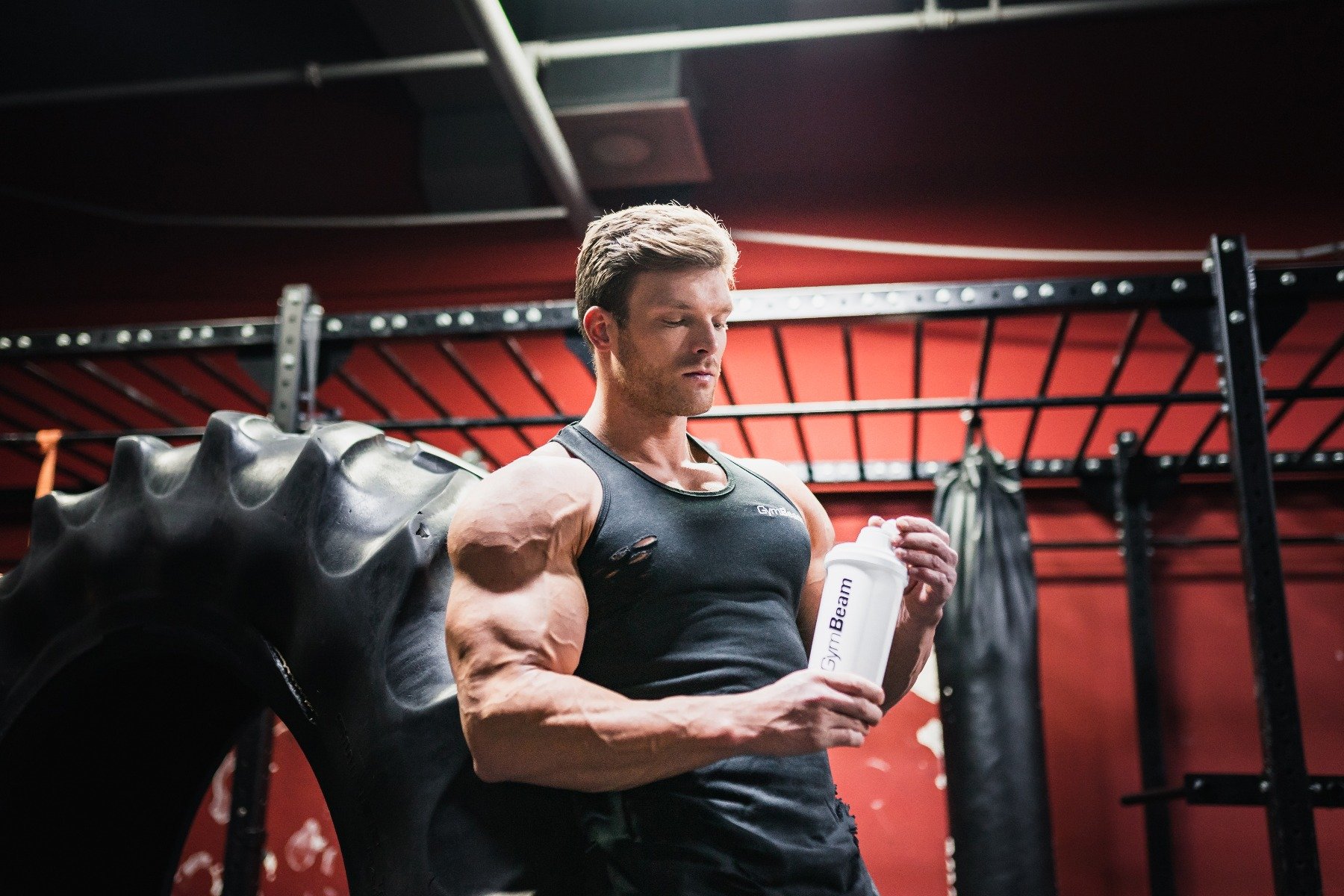
Do you need the loading phase while taking creatine?
Creatine is a supplement that is known to require a loading phase followed by a maintenance phase. But is it really so? This creatine cycle should have three parts [6]:
- 20 – 25 g (or 0.3 g / kg) for 5-7 days (loading phase)
- 5 g for 3-4 days (maintenance phase)
- 1 – 2 weeks without creatine and then the cycle is repeated
However, many studies have confirmed that you do not really need a loading phase when you are taking creatine. In researches, experts use either a direct dose of 5 – 10 g creatine per day or even a smaller amount of 2 – 3 g creatine. However, despite of this, the results recorded the benefits associated with creatine supplementation. [6]
Sometimes the loading phase is used to diagnose whether a person is responding to creatine or to acceleration of the effects of creatine. This phase causes the muscles to become more saturated with creatine and it may cause a greater instant increase in strength and body weight due to water retention. At the same time, the loading phase can also bring you psychological benefits, because you are able to see how you are gaining and getting bigger. However, it is often associated with the side effects of taking too much creatine, such as nausea, diarrhoea and other digestive problems. [6]
From the long-term point of view, the loading phase is not necessary. By consuming a lower dose of creatine for an extended period of time (at least 28 days) you will eventually achieve the same effect and the same saturation point. [6]
What form of creatine is the best?
Creatine has many types that manufacturers sell either individually or as multi-component creatines. The most popular form is creatine monohydrate which has been most scientifically tested. The remaining forms of creatine are newer types and are therefore not as thoroughly investigated as creatine monohydrate. Let us mention at least a few other forms of creatine. [43] [44]
- Creatine Monohydrate – the long-term favourite form of creatine with proven effects. Even 5 to 10 g of creatine monohydrate can lead to increased performance, muscle endurance and muscle size.
- Micronized Creatine – is 100% pure creatine monohydrate, which guarantees even better dissolving capacity.
- Creatine Magnesium Chelate – is a promising nutritional supplement that prevents body water volume gain at low doses.
- Creatine Pyruvate – causes higher doses of creatine in the blood, however, it has not been proved to have an effect on a higher performance.
- Creatine Citrate – is better dissolvable in water than creatine monohydrate.
- Creatine Malate – is creatine bound by malic acid. Compared to creatine monohydrate, it dissolves better in water, significantly accelerates regeneration and reduces fatigue during training.
- Creatine Nitrate – is a creatine molecule bound to a nitrate molecule. Creatine nitrate is about 10 times more dissolvable in water than creatine monohydrate and it improves vascular stretching.
- Buffered Creatine (Kre-Alkalyn) – has a higher usability, provides faster strength and muscle mass growth. In addition, it neutralizes lactic acid which helps in regeneration and achieving better performance.
- Creatine Hydrochloride HCl – is 38 times more dissolvable than creatine monohydrate and can be absorbed more effectively in the body.
- Creatine Ethyl Ester – creatine esterification increases its ability to easily penetrate the walls of muscle cells, thus positively affecting their function and improving the absorption of creatine into muscles.
- Multi-Component Creatine – combines the benefits and effects of different forms of creatine into a single mixture. It can contain up to 7 types of creatine per product, such as Crea7in. Physically active people and athletes will appreciate its benefits, such as rapid absorption, muscle mass growth and more energy supply for better performance.
If you would like to learn more about types of creatine, read our article Everything you must know about creatine and its forms.
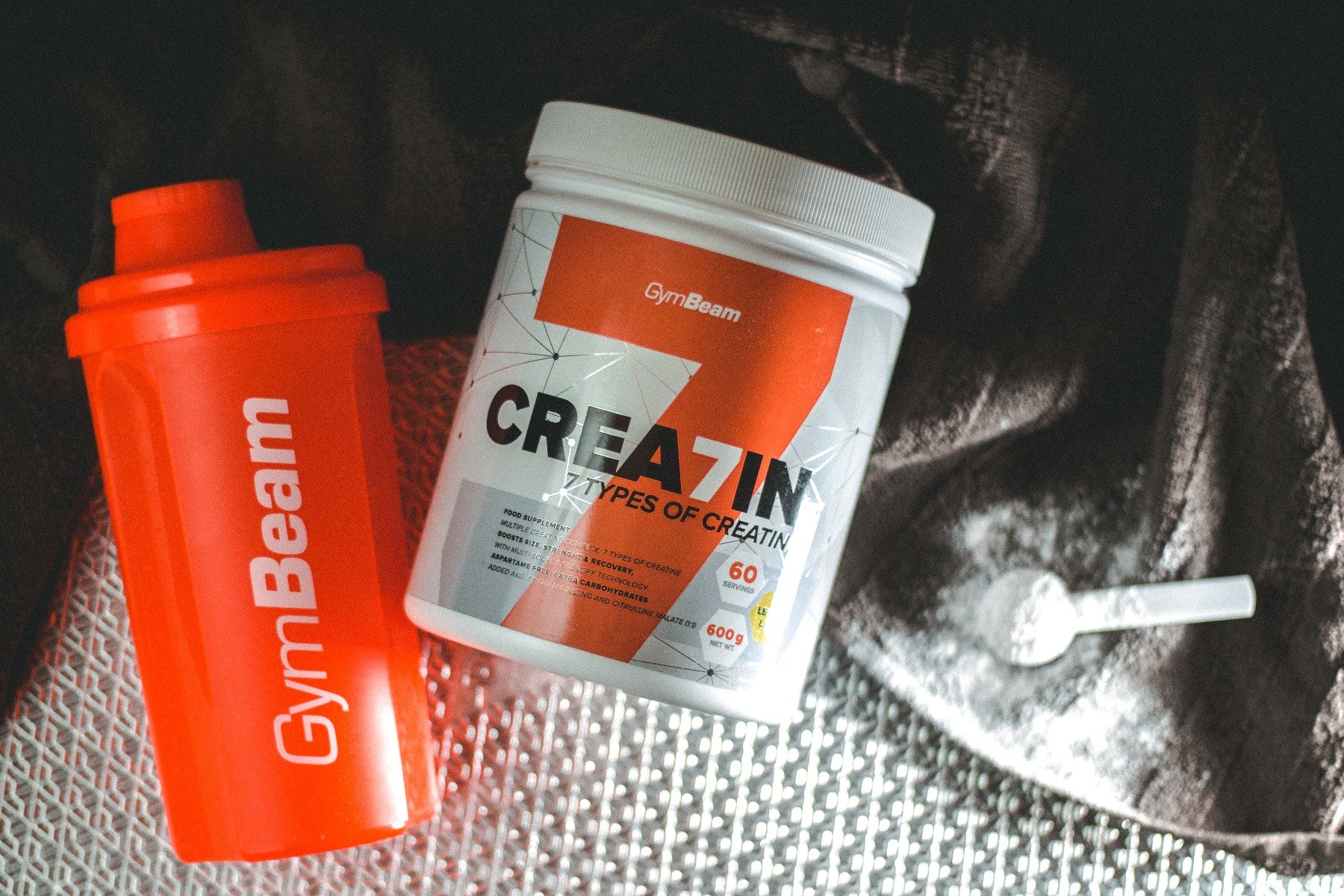
Is creatine safe?
When you take creatine you really don’t have to worry about your health and safety. It is absolutely safe food supplement. As a supplement, it has been thoroughly investigated and studies have shown no adverse side effects. [27] [28] [29]
1. Creatine and cancer
The biggest myths that exist about creatine are that it causes cancer or kidney problems. We can assure you that there is no scientific evidence linking creatine as a factor of any form of cancer. The claims that associate it with cancer are not currently supported by any relevant studies or evidence. In one study conducted on humans, creatine even functioned as a protection of DNA against oxidative damage from various sources, such as exercise. [30] [31] [32]
2. Creatine and kidneys
Concerns that it damages the kidneys have arisen because creatine may cause increase in levels of creatinine above normal levels. This condition is considered to be the indicator of renal impairment. However, if you have healthy kidneys, then creatine supplementation is safe for you. If you have any kind of kidney disease, we advise you to consult your doctor regarding the creatine supplementation, as there are no long-term studies to investigate the use of creatine in case of people with kidney disease.
Dietary creatine and liver-producing creatine transform skeletal muscles, brain and other tissues into phosphocreatine. This is then involved in the process of adenosine triphosphate production by-product of which is creatinine. Normally, creatinine is excluded from kidneys as a waste product. If renal function decreases, creatinine purity also decreases. This can be detected by a blood test or measured by a combination of a blood test and a urine sample. Blood creatinine level is the most frequently used indicator of renal function. It is assumed that if the creatinine level is high, the kidneys are not healthy. [42] [42]
However, creatine supplementation does not affect kidney function, only the level of creatinine. Studies have not found out any safety risks of creatine for renal damage within a short-term or long-term use of creatine. In healthy adults, doses containing less than 5 g of creatine per day are unlikely to significantly increase the level of creatinine. However, higher doses may cause a slight increase of creatinine, but this does not mean renal impairment. Most studies recorded only a slight increase in creatinine level at a dose of 20 g of creatine per day. [34 – 40]
In people with suboptimal renal function, it may be safe to supplement creatine at a dose of up to 3 g per day. [33] However, long-term studies that would confirm the safety of creatine use in such cases are absent.
Does creatine cause hair loss?
A study carried out in 2009 suggested that creatine supplementation could worsen hair loss. In this RCT study, men who consumed creatine had increased levels of dihydrotestosterone (DHT) which contributes to hair loss, especially in men. [7] [8]
DHT is a testosterone androgen metabolite. An enzyme called 5-alpha-reductase converts free testosterone into DHT. DHT can then bind to hair follicle receptors on the scalp, leading to shrinkage and cessation of hair formation over time. However, drugs that block the action of 5-alpha reductase can be very effective for hair loss. [9] [10]
Hair loss in men results from the interaction of hair follicles with DHT. Whether hair will fall out or not depends on the individual’s sensitivity to DHT. However, the process of hair loss can be also affected by other factors, such as genetic predisposition or thin hairline. [11] [12]
In women, the development of hair loss is less clear. It is due to genetic factors, but it is not exactly identified which ones. It is also presumed that DHT does not play such an important role in hair loss in women as in case of men. Contradictory evidence also exists regarding the effect of estrogen on hair loss in women, so it is almost impossible to say with certainty what causes hair loss. [13] [14] [15]
Dihydrotestosterone (DHT) and genetics play an important role in hair loss in men and a smaller role in hair loss in women. However, the factors that cause hair loss in women are less known than the factors that cause male baldness.
Only one small randomized controlled study associated creatine supplementation with elevated levels of DHT. This study was carried out on 20 healthy young men, rugby players, who were divided into 2 groups. One group took placebo and the other creatine monohydrate at a dose of 25 g for the first 7 days and then 5 g during the maintenance phase for 14 days. The results found that there were no major changes in testosterone levels between the groups. However, the proportion of DHT increased significantly in the group taking creatine by up to 56.1% on the seventh day of testing, and on the twenty-first day the DHT was 40.8% higher than before testing. [8]
Nowadays, in addition to the abovementioned research, there is no other study to test the effect of creatine on the proportion of DHT levels. However, there are plenty of studies dealing with the effects of creatine on testosterone. Only two of them have confirmed an increase in testosterone after adding 20 g of creatine for 6 and 7 days. [16] [17]
The remaining 10 randomized controlled studies found no effect of creatine on testosterone. These studies ranged from 6 days to 10 weeks and they tested creatine doses from 3 to 25 g per day. Moreover, it is important to note that 5 studies tested the effects of creatine on free testosterone, and thus the form of testosterone that converts to DHT, at which no significant increase was found out. Therefore, current evidence does not allow to truly refute, but neither to confirm the effects of creatine on hair loss. [8] [18-26]
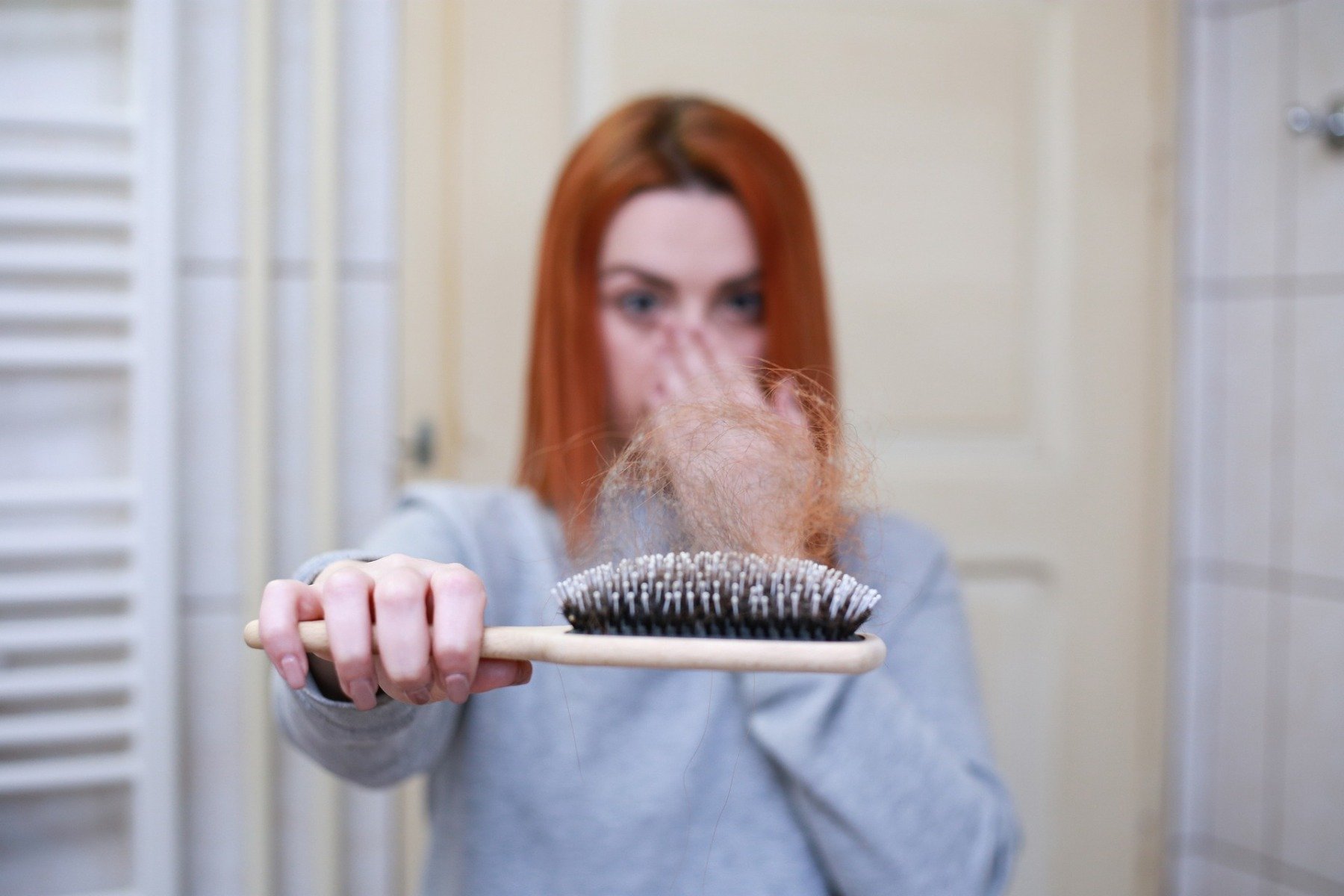
Does creatine cause water retention?
If we want to answer the question of whether creatine causes water retention, we need to look at previous studies. Studies that tested intake of 5 g of creatine (in the maintenance phase, immediately after the loading phase) recorded an increase of total body water volume of 6.2% in 9 weeks and 1.1 kg in 42 days. [51] [52] However, some studies comparing creatine supplementation in combination with training did not discover any significant differences in the percentage amount of water. It seems that slight water retention was observed at higher doses of creatine. At a dose of 0.03 g / kg or 2.3 g per day, creatine does not cause water retention, despite the increase of total body water volume due to muscle mass growth. [53]
Studies that measured extracellular and intracellular water showed similar increases in both cases. Creatine does not tend to change the water ratio in different tissues. At least one study confirmed that there was no significant difference in intracellular and extracellular water concentrations after 14 weeks of taking 5 g of creatine per day. [54]
Therefore, water retention really depends on the amount of creatine we take into the body. However, there is no noticeable increase, rather only a slight water retention.

What are the side effects of creatine?
Creatine as a supplement is the most tested nutritional supplement in term of safety and side effects. Scholars have carried out many researches based on various doses of creatine and as the only negative effect, they have presented the possibility of digestive problems and cramps. However, these are formed due to insufficient hydration or when a person takes too much creatine. [48] [50]
A dose of 5 g a day does not cause any adverse side effects and also a dose of 10 g a day during a 310-day period did not cause any heavy side effects as opposed to placebo. Moreover, supplementation of creative has been proven to be safe also for children and young people with a dose of 3 – 5 g a day during a 2- to 6-month period. [49]
We believe that in this article you were able to find all answers to your questions regarding creatine and its effects, functioning, dosage, consumption and safety. Surely, we recommend you to try creatine supplementation, because it is a functional, effective and affordable nutritional supplement that has its place in diet of beginners as well as advanced athletes.
Write us in the comments below about your creatine experience. And if you liked this article, we will be very thankful if you support it by sharing.
[1] Rudy Mawer, MSc, CISSN - Creatine 101 — What Is It and What Does It Do? – https://www.healthline.com/nutrition/what-is-creatine
[2] Edvardson S1, Korman SH, Livne A, Shaag A, Saada A, Nalbandian R, Allouche-Arnon H, Gomori JM, Katz-Brull R. - l-arginine:glycine amidinotransferase (AGAT) deficiency: clinical presentation and response to treatment in two patients with a novel mutation – https://www.ncbi.nlm.nih.gov/pubmed/20682460
[3] Robert Cooper,corresponding author1 Fernando Naclerio,1 Judith Allgrove,1 and Alfonso Jimenez1,2 - Creatine supplementation with specific view to exercise/sports performance: an update – https://www.ncbi.nlm.nih.gov/pmc/articles/PMC3407788/
[4] Harris RC1, Lowe JA, Warnes K, Orme CE. - The concentration of creatine in meat, offal and commercial dog food. – https://www.ncbi.nlm.nih.gov/pubmed/9160426
[5] Dahl O. - Estimating protein quality of meat products from the content of typical amino-acids and creatine. – https://www.ncbi.nlm.nih.gov/pubmed/5841078
[6] Kamal Patel - Do I need to load creatine? – https://examine.com/nutrition/do-i-need-to-load-creatine/
[7] Michael Hull - Does creatine cause hair loss? – https://examine.com/nutrition/does-creatine-cause-hairloss/
[8] van der Merwe J1, Brooks NE, Myburgh KH. - Three weeks of creatine monohydrate supplementation affects dihydrotestosterone to testosterone ratio in college-aged rugby players. – https://www.ncbi.nlm.nih.gov/pubmed/19741313
[9] Kaufman KD1. - Androgens and alopecia. – https://www.ncbi.nlm.nih.gov/pubmed/12573818
[10] Bang HJ1, Yang YJ, Lho DS, Lee WY, Sim WY, Chung BC. - Comparative studies on level of androgens in hair and plasma with premature male-pattern baldness. – https://www.ncbi.nlm.nih.gov/pubmed/14757277
[11] Rathnayake D1, Sinclair R. - Male androgenetic alopecia. – https://www.ncbi.nlm.nih.gov/pubmed/20426708
[12] Nyholt DR, Gillespie NA, Heath AC, Martin NG. - Genetic basis of male pattern baldness. – https://www.ncbi.nlm.nih.gov/pubmed/14675213
[13] Price VH1. - Androgenetic alopecia in women. – https://www.ncbi.nlm.nih.gov/pubmed/12894991
[14] Redler S1, Messenger AG2, Betz RC3. - Genetics and other factors in the aetiology of female pattern hair loss. – https://www.ncbi.nlm.nih.gov/pubmed/28453904
[15] Yip L1, Rufaut N, Sinclair R. - Role of genetics and sex steroid hormones in male androgenetic alopecia and female pattern hair loss: an update of what we now know. – https://www.ncbi.nlm.nih.gov/pubmed/21605090
[16] D.Sheikholeslami Vatani - The effects of creatine supplementation on performance and hormonal response in amateur swimmers – https://www.sciencedirect.com/science/article/abs/pii/S0765159711001171
[17] H.Arazi - Effects of short term creatine supplementation and resistance exercises on resting hormonal and cardiovascular responses – https://www.sciencedirect.com/science/article/abs/pii/S0765159715000039
[18] Cooke MB1, Brabham B, Buford TW, Shelmadine BD, McPheeters M, Hudson GM, Stathis C, Greenwood M, Kreider R, Willoughby DS. - Creatine supplementation post-exercise does not enhance training-induced adaptations in middle to older aged males. – https://www.ncbi.nlm.nih.gov/pubmed/24633488
[19] Cook CJ#1,2,3, Crewther BT#2, Kilduff LP#4, Drawer S#1, Gaviglio CM#5 - Skill execution and sleep deprivation: effects of acute caffeine or creatine supplementation - a randomized placebo-controlled trial. – https://www.ncbi.nlm.nih.gov/pubmed/21324203
[20] Crowe MJ1, O'Connor DM, Lukins JE. - The effects of beta-hydroxy-beta-methylbutyrate (HMB) and HMB/creatine supplementation on indices of health in highly trained athletes. – https://www.ncbi.nlm.nih.gov/pubmed/12945829
[21] Hoffman J1, Ratamess N, Kang J, Mangine G, Faigenbaum A, Stout J. - Effect of creatine and beta-alanine supplementation on performance and endocrine responses in strength/power athletes. – https://www.ncbi.nlm.nih.gov/pubmed/17136944
[22] Eijnde BO1, Hespel P. - Short-term creatine supplementation does not alter the hormonal response to resistance training. – https://www.ncbi.nlm.nih.gov/pubmed/11252073
[23] Volek JS1, Ratamess NA, Rubin MR, Gómez AL, French DN, McGuigan MM, Scheett TP, Sharman MJ, Häkkinen K, Kraemer WJ. - The effects of creatine supplementation on muscular performance and body composition responses to short-term resistance training overreaching. – https://www.ncbi.nlm.nih.gov/pubmed/14685870
[24] H Faraji, H Arazi, D Vatani, M Hakimi - The effects of creatine supplementation on sprint running performance and selected hormonal responses – https://www.ajol.info/index.php/sajrs/article/view/59293
[25] Creatine supplementation alters the hormonal response to resistance exercise – https://hrcak.srce.hr/index.php?show=clanak&id_clanak_jezik=82635
[26] https://journals.lww.com/nsca-jscr/Abstract/1997/08000/Response_of_Testosterone_and_Cortisol.9.aspx
[27] Groeneveld GJ1, Beijer C, Veldink JH, Kalmijn S, Wokke JH, van den Berg LH. - Few adverse effects of long-term creatine supplementation in a placebo-controlled trial. – https://www.ncbi.nlm.nih.gov/pubmed/15795816
[28] Lopez RM1, Casa DJ, McDermott BP, Ganio MS, Armstrong LE, Maresh CM. - Does creatine supplementation hinder exercise heat tolerance or hydration status? A systematic review with meta-analyses. – https://www.ncbi.nlm.nih.gov/pubmed/19295968
[29] Greenwood M1, Kreider RB, Melton C, Rasmussen C, Lancaster S, Cantler E, Milnor P, Almada A. - Creatine supplementation during college football training does not increase the incidence of cramping or injury. – https://www.ncbi.nlm.nih.gov/pubmed/12701814
[30] Rahimi R - Creatine supplementation decreases oxidative DNA damage and lipid peroxidation induced by a single bout of resistance exercise. – https://www.ncbi.nlm.nih.gov/pubmed/22080314
[31] Taes YE, Bruggeman E, Bleys J, Delanghe JR. - Lowering methylation demand by creatine supplementation paradoxically decreases DNA methylation. – https://www.ncbi.nlm.nih.gov/pubmed/17692549
[32] Berneburg M1, Gremmel T, Kürten V, Schroeder P, Hertel I, von Mikecz A, Wild S, Chen M, Declercq L, Matsui M, Ruzicka T, Krutmann J. - Creatine supplementation normalizes mutagenesis of mitochondrial DNA as well as functional consequences. – https://www.ncbi.nlm.nih.gov/pubmed/16098029
[33] Kreider RB1, Kalman DS2, Antonio J3, Ziegenfuss TN4, Wildman R5, Collins R6, Candow DG7, Kleiner SM8, Almada AL9, Lopez HL4,10. - International Society of Sports Nutrition position stand: safety and efficacy of creatine supplementation in exercise, sport, and medicine. – https://www.ncbi.nlm.nih.gov/pubmed/28615996
[34] Poortmans JR1, Francaux M. - Adverse effects of creatine supplementation: fact or fiction? – https://www.ncbi.nlm.nih.gov/pubmed/10999421
[35] Farquhar WB1, Zambraski EJ. - Effects of creatine use on the athlete's kidney. – https://www.ncbi.nlm.nih.gov/pubmed/12831718
[36] Pline KA1, Smith CL. - The effect of creatine intake on renal function. – https://www.ncbi.nlm.nih.gov/pubmed/15886291
[37] Francaux M1, Poortmans JR. - Side effects of creatine supplementation in athletes. – https://www.ncbi.nlm.nih.gov/pubmed/19124889
[38] Persky AM1, Rawson ES. - Safety of creatine supplementation. – https://www.ncbi.nlm.nih.gov/pubmed/18652082
[39] Kim HJ1, Kim CK, Carpentier A, Poortmans JR. - Studies on the safety of creatine supplementation. – https://www.ncbi.nlm.nih.gov/pubmed/21399917
[40] Gualano B1, Roschel H, Lancha AH Jr, Brightbill CE, Rawson ES. - In sickness and in health: the widespread application of creatine supplementation. – https://www.ncbi.nlm.nih.gov/pubmed/22101980
[41] Brosnan JT1, Brosnan ME. - Creatine: endogenous metabolite, dietary, and therapeutic supplement. – https://www.ncbi.nlm.nih.gov/pubmed/17430086
[42] Braissant O1, Henry H, Béard E, Uldry J. - Creatine deficiency syndromes and the importance of creatine synthesis in the brain. – https://www.ncbi.nlm.nih.gov/pubmed/21390529
[43] Kamal Patel - What is the best form of creatine? – https://examine.com/nutrition/what-is-the-best-form-of-creatine/
[44] Kamal Patel - Creatine – https://examine.com/supplements/creatine/#summary1-5
[45] Kamal Patel - How To Take Creatine – https://examine.com/supplements/creatine/#how-to-take
[46] Kamal Patel - When should I take creatine? – https://examine.com/nutrition/when-should-i-take-creatine/
[47] Candow DG1, Chilibeck PD, Chad KE, Chrusch MJ, Davison KS, Burke DG. - Effect of ceasing creatine supplementation while maintaining resistance training in older men. – https://www.ncbi.nlm.nih.gov/pubmed/15263100
[48] Groeneveld GJ1, Beijer C, Veldink JH, Kalmijn S, Wokke JH, van den Berg LH. - Few adverse effects of long-term creatine supplementation in a placebo-controlled trial. – https://www.ncbi.nlm.nih.gov/pubmed/15795816
[49] Creatine – https://www.webmd.com/vitamins/ai/ingredientmono-873/creatine
[50] Shao A1, Hathcock JN. - Risk assessment for creatine monohydrate. – https://www.ncbi.nlm.nih.gov/pubmed/16814437
[51] Kutz MR1, Gunter MJ. - Creatine monohydrate supplementation on body weight and percent body fat. – https://www.ncbi.nlm.nih.gov/pubmed/14636103
[52] Francaux M1, Poortmans JR. - Effects of training and creatine supplement on muscle strength and body mass. – https://www.ncbi.nlm.nih.gov/pubmed/10408330
[53] Rawson ES1, Stec MJ, Frederickson SJ, Miles MP. - Low-dose creatine supplementation enhances fatigue resistance in the absence of weight gain. – https://www.ncbi.nlm.nih.gov/pubmed/20591625
[54] Eliot KA1, Knehans AW, Bemben DA, Witten MS, Carter J, Bemben MG. - The effects of creatine and whey protein supplementation on body composition in men aged 48 to 72 years during resistance training. – https://www.ncbi.nlm.nih.gov/pubmed/18309444
[55] The Editors of Encyclopaedia Britannica - Adenosine triphosphate – https://www.britannica.com/science/adenosine-triphosphate
[56] Layne Norton, PhD - Creatine: What It Is And How It Works – https://www.bodybuilding.com/content/creatine-what-it-is-and-how-it-works.html
[57] Steenge GR1, Simpson EJ, Greenhaff PL. - Protein- and carbohydrate-induced augmentation of whole body creatine retention in humans. – https://www.ncbi.nlm.nih.gov/pubmed/10956365
[58] Deldicque L1, Theisen D, Bertrand L, Hespel P, Hue L, Francaux M. - Creatine enhances differentiation of myogenic C2C12 cells by activating both p38 and Akt/PKB pathways. – https://www.ncbi.nlm.nih.gov/pubmed/17652429
[59] Burke DG1, Candow DG, Chilibeck PD, MacNeil LG, Roy BD, Tarnopolsky MA, Ziegenfuss T. - Effect of creatine supplementation and resistance-exercise training on muscle insulin-like growth factor in young adults. – https://www.ncbi.nlm.nih.gov/pubmed/18708688
[60] Stefano Schiaffinocorresponding author1 and Cristina Mammucari2 - Regulation of skeletal muscle growth by the IGF1-Akt/PKB pathway: insights from genetic models – https://www.ncbi.nlm.nih.gov/pmc/articles/PMC3143906/
[61] Olsen S1, Aagaard P, Kadi F, Tufekovic G, Verney J, Olesen JL, Suetta C, Kjaer M. - Creatine supplementation augments the increase in satellite cell and myonuclei number in human skeletal muscle induced by strength training. – https://www.ncbi.nlm.nih.gov/pubmed/16581862
[62] Saremi A1, Gharakhanloo R, Sharghi S, Gharaati MR, Larijani B, Omidfar K. - Effects of oral creatine and resistance training on serum myostatin and GASP-1. – https://www.ncbi.nlm.nih.gov/pubmed/20026378
[63] Michael E. Powers,corresponding author* Brent L. Arnold,† Arthur L. Weltman,‡ David H. Perrin,§ Dilawaar Mistry,‡ David M. Kahler,‡ William Kraemer,‖ and Jeff Volek‖ - Creatine Supplementation Increases Total Body Water Without Altering Fluid Distribution – https://www.ncbi.nlm.nih.gov/pmc/articles/PMC155510/
[64] Gualano B1, Novaes RB, Artioli GG, Freire TO, Coelho DF, Scagliusi FB, Rogeri PS, Roschel H, Ugrinowitsch C, Lancha AH Jr. - Effects of creatine supplementation on glucose tolerance and insulin sensitivity in sedentary healthy males undergoing aerobic training. – https://www.ncbi.nlm.nih.gov/pubmed/17396216
[65] Op 't Eijnde B1, Ursø B, Richter EA, Greenhaff PL, Hespel P. - Effect of oral creatine supplementation on human muscle GLUT4 protein content after immobilization. – https://www.ncbi.nlm.nih.gov/pubmed/11147785
[66] Nelson AG1, Arnall DA, Kokkonen J, Day R, Evans J. - Muscle glycogen supercompensation is enhanced by prior creatine supplementation. – https://www.ncbi.nlm.nih.gov/pubmed/11445755
[67] Sakellaris G1, Nasis G, Kotsiou M, Tamiolaki M, Charissis G, Evangeliou A. - Prevention of traumatic headache, dizziness and fatigue with creatine administration. A pilot study. – https://www.ncbi.nlm.nih.gov/pubmed/18053002
[68] McMorris T1, Harris RC, Swain J, Corbett J, Collard K, Dyson RJ, Dye L, Hodgson C, Draper N. - Effect of creatine supplementation and sleep deprivation, with mild exercise, on cognitive and psychomotor performance, mood state, and plasma concentrations of catecholamines and cortisol. – https://www.ncbi.nlm.nih.gov/pubmed/16416332

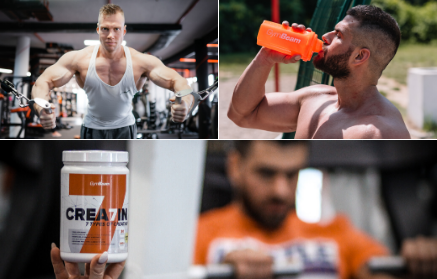
Add a comment